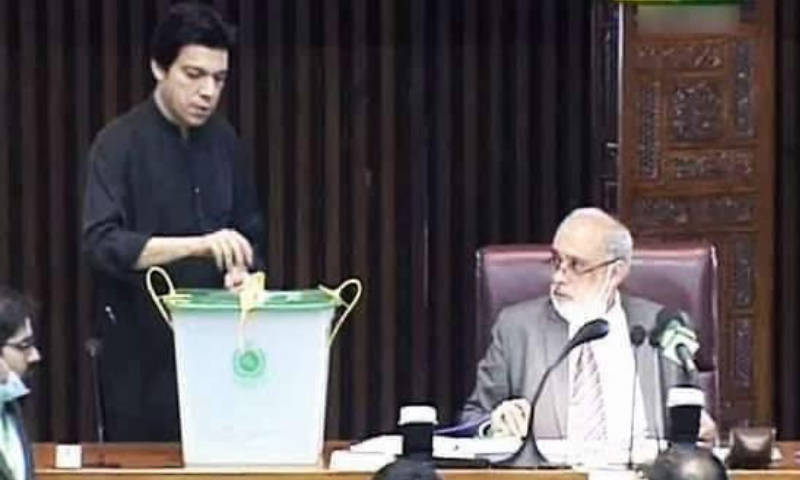The Election Commission of Pakistan (ECP) on Wednesday rejected a plea seeking to stop the electoral body from issuing the notification regarding PTI's Faisal Vawda's victory in the recently held Senate polls.
The decision was taken in a hearing of the commission, headed by its member from Punjab, Altaf Ibrahim Qureshi.
Vawda, who appeared in person in the hearing along with his new counsel, was asked by the ECP to appear again and submit his answers to the commission in the next hearing.
During today's hearing, Vawda told the ECP that he was unable to appear last time because his mother was unwell. He had brought a medical certificate to back this, he told the body.
When Vawda's lawyer asked for time to prepare for the case, the petitioner, Jahangir Khan Jadoon, contended that Vawda himself was present to answer the questions raised.
"Faisal Vawda lied about his dual nationality," he argued.
The ECP’s Punjab member pointed out that several columns were left empty in Vawda's nomination papers for the National Assembly in 2018.
"Faisal Vawda is not a common man [but] a lawmaker," he added.
Jadoon said that the Islamabad High Court (IHC) had declared Vawda's affidavit regarding his nationality as "false", adding that it was the responsibility of the commission to stop a "dishonest man" from becoming a part of the Parliament.
The ECP's member from Khyber Pakhtunkhwa said he wanted to take advantage of Vawda's presence in the hearing today.
Addressing the minister, he said: " You were asked three questions. Tell us why some sections in the nomination papers were left empty."
Vawda replied that he was a "layman and this is a political case", claiming that the petitioner, Jahangir Jadoon, was former prime minister Nawaz Sharif's man.
To this, the ECP member told Vawda to speak on the petition instead.
Regarding his absence in past hearings, Vawda said that his mother was "fighting for her life", adding that he "could not leave her, even if he was hanged".
Vawda assured the ECP of his presence in the next hearing on March 18.
Meanwhile, another petition was filed by Rashid A. Rizvi to stop the ECP from notifying Faisal Vawda's Senate victory. Rizvi said Vawda had written the United States as his place of birth in his passport.
"He should be asked when he gave up his nationality. We should be given temporary relief by stopping Faisal Vawda's notification."
ECP member Qureshi said that the petition would be heard alongside other petitions on the same matter. "We can de-notify after the decision is taken regarding [Vawda's] ineligibility but we cannot stop the notification at the moment."
Jadoon argued that if the notification was not stopped, the minister would be able to cast his vote in the election for Senate chairman and deputy chairman, scheduled to be held on March 12.
However, Qureshi replied that the right of those who had voted Vawda into the Senate could not be negated.
Rejecting the plea to stop the ECP's notification of Vawda's win, the commission fixed the next date of hearing for March 18.
SHC issues notices
Meanwhile, the Sindh High Court (SHC) issued notices to the ECP and others on Tuesday on a petition filed by Vawda challenging the jurisdiction of the ECP to hear complaints against him.
Vawda, through his lawyer, had approached the SHC and contended that he was dissatisfied with the Feb 24 order of the ECP that dismissed his application in which he had sought dismissal of all complaints pending against him.
The lawyer argued that three private respondents had filed complaints in the ECP against Vawda, seeking his disqualification on identical grounds that he did not disclose his US nationality in the nomination papers filed during the general elections in 2018.
He submitted that Vawda had recently been elected as senator and was no more an MNA as his resignation was accepted on March 3.
He further maintained that these complaints against his client were not maintainable and that an application had been filed before the ECP to dismiss the same, but was rejected.
The counsel contended that the ECP had no jurisdiction to hear these complaints under the Election Act, 2017, and the Constitution, and pleaded before the SHC to issue a restraining order to the ECP and also declare that the body has no authority to hear such cases.














































